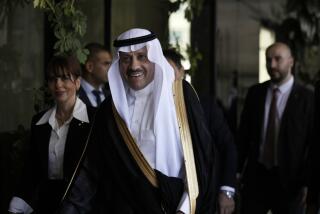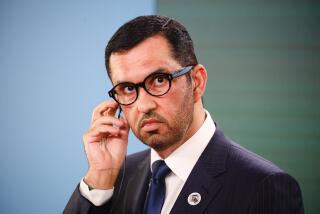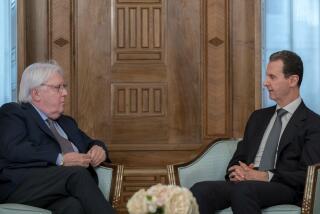Arab Summit to Open Wednesday : Mideast’s Shifting Alliances to Be Displayed in Casablanca
- Share via
CASABLANCA, Morocco — Arab League summits are a lot like musical chairs.
Like players in the party game, the nations of the Arab world go round and round in between summits, forming alliances and breaking them, shifting from “radical” to “moderate” positions as it serves their interests. The music stops when the summits convene, and everybody sits down to thrash out their differences.
On Wednesday, the music stops in Casablanca, where the heads of state of most of the nations of the Middle East will sit down for the 13th time since the Arab League was founded 40 years ago. And when they do so, some will be sitting in positions quite different from those they occupied at previous summits.
Take Iraq, for instance. In 1979, at a summit in Baghdad, the Iraqis helped to push the Egyptians out of the game by sponsoring a resolution expelling them from the Arab League for signing a peace treaty with Israel. But now, Iraqi President Saddam Hussein is coming to Casablanca to lobby for Egypt’s readmittance to the 21-member league, among other things.
Born-Again Moderates
This time around, Saddam Hussein and Palestine Liberation Organization Chairman Yasser Arafat, the two born-again moderates of the Arab world, will be aligned with Jordan’s King Hussein.
For their part, the Jordanian monarch and the PLO leader hope to rally other moderates behind the king’s call for a new “constructive alignment” to support their joint approach toward peace negotiations with Israel.
The last time they met at the summit level, in Fez, Morocco, three years ago, the Arabs displayed a seldom-seen degree of unanimity in adopting a common approach toward peace talks that became known as “the Fez plan.”
The Fez plan called for the creation of an independent Palestinian state and for Israeli withdrawal from all territories occupied during and since the 1967 Six-Day War, in return for a guarantee of the right of “all states in the region to live in peace.” The plan was then and remains unacceptable to Israel. But it was significant for being the first time that the Arabs had agreed on a unified plan for Middle East peace.
Since then, however, the Arab world has fallen more deeply into discord, the split between moderates and radicals has widened and the terrorism that was once directed at Israel and the West has turned in on itself as Jordanian diplomats are assassinated in Europe and bombs are exploded in Kuwait.
‘Spirit of Fez’
Morocco’s King Hassan II has now called the Casablanca summit in the hopes of “recapturing some of the spirit of Fez,” said a Moroccan diplomat. “We hope that, by getting the Arabs to come here and talk about their differences, we can purify the atmosphere and restore some degree of unanimity to Arab ranks,” the diplomat added.
Thus far, however, Hassan’s summons to meet in Casablanca has only underscored Arab disunity and the reasons why it has taken three years since Fez to meet again. Only 15 of the 21 league members have confirmed that they are coming--and some, like Libya and Kuwait, are to be represented by lower-ranking officials. At the last minute, in what was seen as a blow to Hassan’s prestige, even Saudi Arabia’s King Fahd decided to stay away and to send Crown Prince Abdullah in his place.
Hard-line states such as Syria, Algeria and South Yemen and hapless ones such as Lebanon, which remains under Syrian control, have said they will boycott the session. Two others, Yemen and Somalia, have not yet announced their intentions, although both are expected to attend.
The lineup is not final, however. Libyan leader Moammar Kadafi is unpredictable, and “it would not be out of character for him to keep everybody guessing and then personally swoop down on the summit at the last minute,” a Western diplomat said.
Even Syria, which has denounced the summit as a scheme “to surrender to Zionist plots,” may in the end send a low-level delegation, if only to keep from forfeiting the field to the moderates, many diplomats believe. “If the Syrians feel that major decisions are going to be taken and that these decisions will further increase their isolation, they will probably come,” a senior Arab diplomat said.
Agenda Is Vague
Hassan has put two vaguely phrased items on the summit’s agenda.
The first and most important is a discussion of the Palestinian question “in all its aspects” and an examination of recent Middle East peace moves in light of the Fez accord.
When this comes up, Hussein and Arafat are expected to press for Arab approval of their Feb. 11 agreement to pursue peace talks first with the United States and later at an international conference with Israel.
“The main point of this summit is to give Hussein and Arafat an Arab umbrella for their peace initiative by integrating it into the framework of Fez,” said an Arab diplomat. “If they can do that, the moderates will have achieved a major victory.”
However, analysts caution that this is still an extremely divisive issue and predict that some moderates, notably Saudi Arabia, will not allow the summit to give an unqualified endorsement to Hussein for fear of dangerously isolating the Syrians. “Hussein may get an Arab umbrella,” said a Western diplomat. “But it will probably be a very tattered umbrella with a lot of spokes sticking through the material.”
For the moderates, the key issue here will be the question of Egypt’s readmittance to the Arab League. Jordan, Iraq and the PLO have been pressing for this, but Egyptian officials in Cairo said before the summit that they thought the Saudis would keep the issue from being raised on the conference floor.
“The Saudis have been having a heyday in Egypt’s absence . . . leading what is left of Arab ranks,” said one Egyptian official. “If Egypt returns to the fold, the Saudis will either have to contend with a very experienced partner or take second place.”
Egypt’s readmission would also infuriate the radicals and further divide Arab ranks--something that the jittery Persian Gulf states, themselves now the targets of Arab terrorism, are expected to try to avoid.
More to Read
Sign up for Essential California
The most important California stories and recommendations in your inbox every morning.
You may occasionally receive promotional content from the Los Angeles Times.











